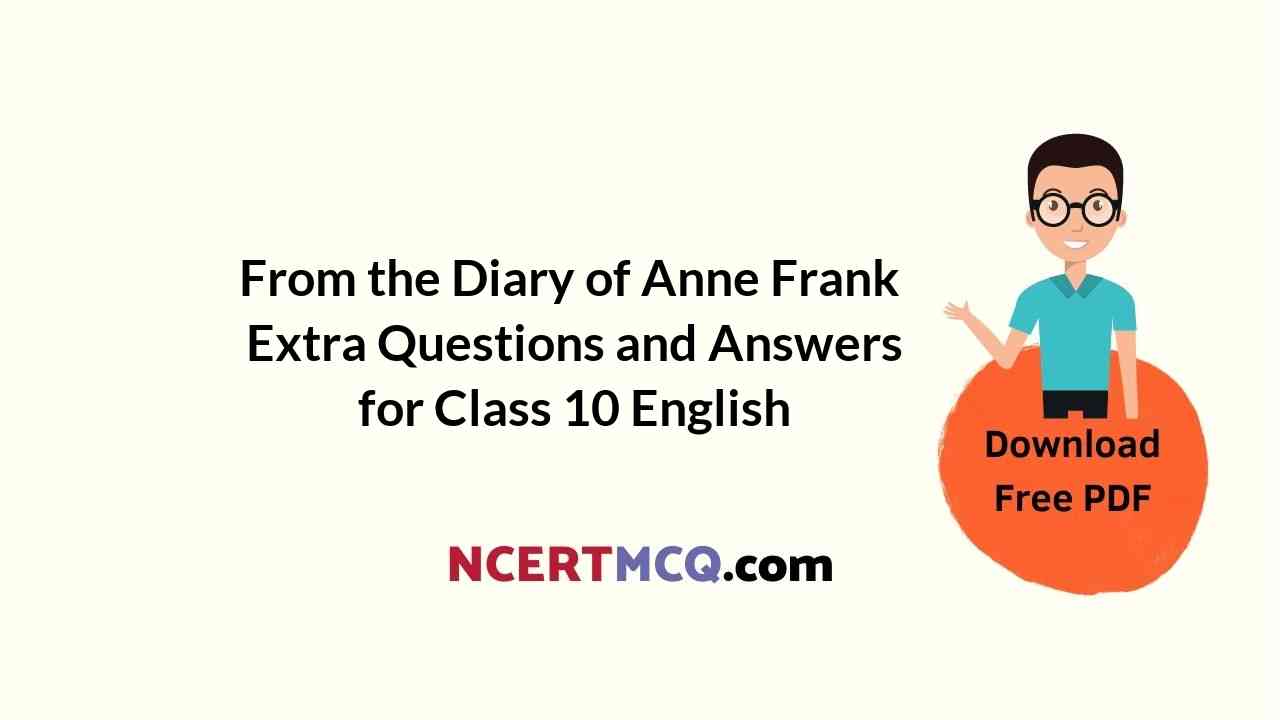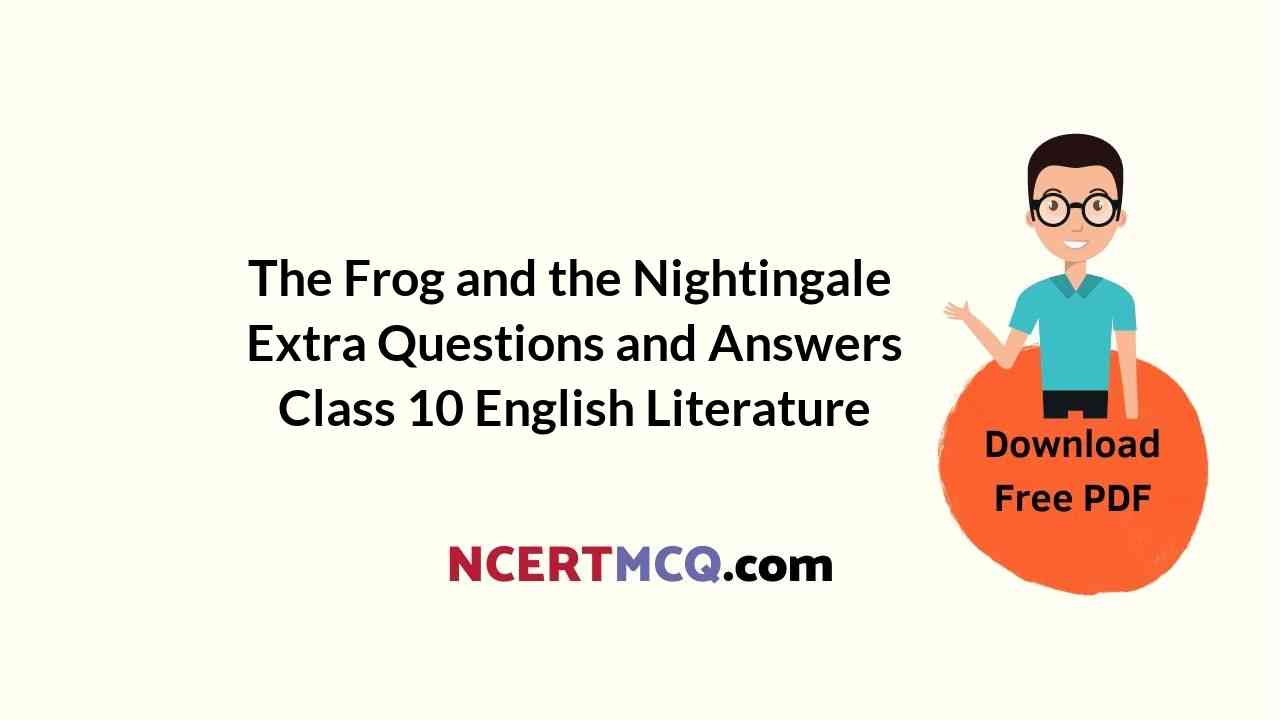Here we are providing The Snake and the Mirror Extra Questions and Answers Class 9 English Beehive, Extra Questions for Class 9 English was designed by subject expert teachers. https://ncertmcq.com/extra-questions-for-class-9-english/
The Snake and the Mirror Extra Questions and Answers Class 9 English Beehive
The Snake and the Mirror Extra Questions and Answers Short Answer Type
The Snake And The Mirror Extra Questions And Answers Question 1.
Who narrated his encounter with a snake? To whom? Why did he narrate the incident?
Answer:
The narrator of the incident was a homeopathic doctor. One day, when the narrator and some others were discussing snakes, the doctor was reminded of his own encounter with a snake and he narrated the incident.
The Snake And The Mirror Extra Questions And Answers Pdf Question 2.
When and where did the incident with the snake take place?
Answer:
The incident took place in the narrator’s room after he had taken his meal in a restaurant and had returned to his room at about ten o’clock in the night.
The Snake And The Mirror Questions And Answers Question 3.
Why did the narrator have to light the kerosene lamp on reaching his room?
Answer:
The narrator had to light the kerosene lamp because it was ten o’clock and it was very dark. The room did not have electricity and the narrator had limited money and could not afford a better place.
The Snake And The Mirror Extra Questions Question 4.
Describe the narrator’s room?
Answer:
The narrator lived in a small, poorly furnished rented room infested with rats. It was an outer room, its one wall facing the open yard. The room had two windows and its tiles were supported by gables that rested on the beam over the wall. There was no ceiling. The room was not electrified. Outside the room there was a veranda. The room was meagrely furnished; among the few pieces of furniture, there was his bed, a chair, a table with his medical books, usual accessories, a kerosene lamp and a mirror on it.
Snake And The Mirror Extra Questions Question 5.
What circumstances prompted the doctor to live in a small, poor house?
Answer:
The doctor had just started his practice and his earnings were meagre. Therefore, he lived in a small, poor house because he could not afford to rent a better and more comfortable accommodation. Besides, he was not married at that time so he could manage in a small rented room until the time he got married.
The Snake And The Mirror Extra Questions And Answers Class 9 Question 6.
The doctor was not a man with many material possessions. Elaborate.
Answer:
The doctor had just started his practice. Therefore, his earnings were meagre. He lived in a small rented room, which was not electrified. He had only sixty rupees in his bag. Apart from a few shirts and dhotis, he had one solitary black coat. His room was full of rats.
The Snake And The Mirror Question Answer Question 7.
Why was the narrator awake despite the lateness of the hour?
Answer:
It was about ten o’clock on a hot summer night when the narrator reached his room. He made his bed and lay down on it, but he could not sleep due to the heat. He got up and went out to the veranda for a little air, but there was no wind. So, he went back into the room and sat down on the chair.
The Snake And The Mirror Short Question Answer Question 8.
What did the doctor do after coming back inside?
Answer:
The doctor sat on the chair and, opening the box beneath the table, took out a book, the Materia Medica. He opened the book at the table on which stood the lamp and a large mirror. At once he was tempted to look into the mirror and he set about making himself look handsome.
The Snake And The Mirror Questions And Answers Pdf Question 9.
“The sound was a familiar one.” What sound did the narrator hear? What did he think it was? How many times did he hear it? When and why did the sounds stop?
Answer:
The narrator heard the familiar sound of movement of some animals on the beam. He thought that the sound was in fear being made by the scampering of rats as always. He heard the sound thrice. After the third time, the sound stopped. This was probably because of the appearance of the snake and the disappearance of the rats
The Snake And The Mirror Questions And Answers Class 9 Question 10.
What were the narrator’s feelings as he looked into the mirror?
Answer:
At that time the narrator, who was unmarried and a doctor, was a great admirer of beauty and he believed in making himself look handsome. He felt he had to make his presence felt by improving his appearance. He began to comb his hair, adjusting the parting so that it looked straight and neat in order to appear more handsome.
The Snake And The Mirror Class 9 Extra Questions And Answers Question 11.
As he looked at himself in the mirror, which two ‘important’ and ‘earth-shaking’ decisions did the doctor make?
Answer:
The doctor made two important decisions while looking at himself in the mirror. The first decision, an ‘important’ one, was that he would shave daily and grow a thin moustache to look more handsome. The second decision the doctor made was an ‘earth-shaking’ one. It was that he had an attractive smile and that he should keep that attractive smile on his face to look more handsome.
The Snake And The Mirror Lesson Questions And Answers Question 12.
What kind of a woman did the doctor decide to marry? Why?
Answer:
The doctor, who had just started his medical practice, decided to marry a doctor with a lot of money and great medical practice. He also wanted her to be fat, so that in case he made a silly mistake and needed to run away she should not be able to run after him and catch him.
The Snake And The Mirror Question Answers Pdf Question 13.
How did the snake land on the doctor’s chair?
Answer:
The snake fell from the roof of the house with a thud. In no time it wriggled over the back of the narrator’s chair and landed on him. The snake slithered along his shoulder and coiled around his left arm above the elbow. To make matters worse, the snake spread its hood out and its head was hardly three or four inches from his face.
The Snake And The Mirror Class 9 Questions And Answers Question 14.
What was the narrator’s reaction to the sight of the snake?
Answer:
The narrator was frightened at the sight of the snake slithering down his shoulder and coiling itself around his arm. He could not breathe for a while. He was frightened, yet he didn’t jump, didn’t tremble, didn’t cry out as he did not wish to make any sudden movement that would provoke the snake.
Question 15.
How did the narrator show presence of mind when he faced with the snake?
Answer:
When the doctor found a snake on his shoulder, he did not jump, tremble or cry out. He held his breath and became as still as a stone. He knew that the snake would get provoked and strike him if he made any movement since the hood of the snake was only four inches away from his face.
Question 16.
How did the doctor feel when the snake coiled itself around his arm?
Answer:
When the snake coiled itself around the arm of the doctor, he felt some pain as if his arm was being crushed strongly with a rod made of molten fire. His arm lost all strength and felt very weak.
Question 17.
What did the writer think of when the snake was coiled around his arm?
Answer:
The doctor felt like a foolish and weak person when the snake was coiled around his arm. There was a distinct possibility of the snake biting him and the doctor thought of the various medicines he had in his room and cast his mind about to think if any medicine was good enough to save him if the snake did bite him. He felt that God had punished him for being so proud and arrogant. The vanity and pride he had moments ago had vanished. He felt helpless and frightened and smiled feebly at his stupidity and ill-luck.
Question 18.
What made the doctor say “Death lurked four inches away”?
Answer:
The snake was coiled around the doctor’s left arm and its hood was spread and just three or four inches from the doctor’s head. He sat motionless as a statue, his body inactive but his mind thinking of a way out anxiously. He knew very well that the snake would get provoked and bite him at the slightest movement and that the bite would well be fatal. This is what made him utter these words,
Question 19.
How did the snake change the writer’s opinion about himself?
Answer:
The writer was proud of being a doctor and a handsome one at that. To boot, he was a bachelor. He was rather vain and arrogant. Coming face-to-face with the snake made him humble. He thought he was only a poor and stupid doctor who should not be proud of his profession.
Question 20.
What thoughts crossed the doctor’s mind when he saw the snake looking into the mirror?
Answer:
When the doctor saw the snake looking into the mirror, he thought that perhaps it too was admiring its beauty or was trying to make some important, actually frivolous decisions like growing a moustache, or, if it were a female snake, using eye shadow and mascara or wearing a vermilion spot on its forehead.
Question 21.
Why did the snake leave the doctor’s arm?
Answer:
The snake left the doctor’s arm because it saw its reflection in the mirror and was fascinated by it. Perhaps it wanted to enjoy its own reflection by having a closer look.
Question 22.
How was the doctor freed of the hold of the snake?
Answer:
The snake happened to look at its reflection in the mirror on the table. It uncoiled itself from the arm of the doctor, slipped into his lap and then crawled towards the mirror. Perhaps, it too got fascinated by its looks like the doctor had a while ago.
Question 23.
What did the doctor do as the snake sat in front of the mirror?
Answer:
When the snake slithered from the narrator’s arm into his lap, crept onto the table and then moved towards the mirror, the narrator at once availed of the opportunity. He changed from a man cut in granite to a man of flesh and blood. Still holding his breath, so as not to disturb the snake, he got up from the chair and quietly went out through the door into the veranda. From there he leapt into the yard and ran for all he was worth to his friend’s house to save his life.
Question 24.
What did the doctor do when the snake was absorbed in looking at the mirror?
Answer:
As the snake was absorbed in looking at the mirror, the doctor and holding his breath, rose from the chair and quietly slipped out of the room. From there he passed through the veranda and the yard and ran as fast as he could to the house of a friend.
Question 25.
What did the doctor do as soon as he reached his friend’s house? Why?
Answer:
Immediately after reaching his friend’s house, the doctor applied oil to his entire body, took a- bath and put on fresh clothes. He did so because the snake had slithered over his back, shoulder and arm. He wanted to get rid of his creepy feeling and any possible ill-effects of a snake’s touch.
Question 26.
Why does the doctor remark that the snake was “taken with its own beauty”?
Answer:
The doctor remarks that the snake was “taken with its own beauty” because it kept looking-into the mirror just like the doctor had done earlier, the snake sat in front of the mirror looking into it. This led him to conclude that the snake was admiring itself as he had done.
Question 27.
What was the similarity between the doctor and the snake?
Answer:
There was a similarity between the doctor and the snake. Both of them admired of their own beauty. The doctor sat on the chair to read his book but forgot everything as he looked into the mirror and admired himself. He was oblivious to his surroundings and realised the presence of the snake too late. The snake too spotted the mirror, and slithered off to look at its reflection. He, too, was so enamoured with its own looks that it forgot reason why it was there, probably hungry and chasing some rats.
Question 28.
Why did the doctor decide to leave the room?
Answer:
The doctor was already unhappy with the poor condition of his room that did not have electricity and was infested with rats. On top of it all his encounter with the snake, that could have nearly killed him, made him decide to leave the room.
Question 29.
What did the doctor and his friends find when they went to remove things from the room?
Answer:
The doctor and his friends found that there was nothing in the room except for a dirty vest. All the other things had been stolen away by some thief.
Question 30.
Did the doctor marry a fat woman as he had wished?
Answer:
No, the doctor did not marry a fat woman. On the contrary, his wife was a thin and lean person who could run very fast like a sprinter.
Question 31.
What did the thief leave behind? What does the narrator feel about it?
Answer:
The thief had left behind his dirty vest. The vest was so dirty that even the thief did not feel like taking it. The narrator found it insulting because it appeared as the thief wanted to tell the narrator that he had a better sense of cleanliness than the doctor himself.
The Snake and the Mirror Extra Questions and Answers Long Answer Type
Question 1.
What kind of room was the doctor living in and why did he decide to leave that room?
Answer:
The doctor was living in was a small, uncomfortable room that was actually an outer room with one wall facing the open yard and two windows. The room was not electrified and he had to depend on a kerosene lamp for lighting. The roof was tiled and had long supporting gables which rested on a beam over the wall. The room did not have any ceiling and it was infested with rats that kept squeaking all the time.
Since his medical practice was yet not well-established, the doctor did not earn much and could not afford a better place. He was not happy with this poor accommodation but it was all he could afford on his meagre earnings. However, it was only after his encounter with the snake that he decided to leave it. The frightening experience left him shaken and he decided not to live in the room any longer.
Question 2.
What kind of a person was the doctor? What kind of a person did he want to be?
Answer:
The doctor had just started his practice. His earnings were, therefore, meagre. He lived in a small rented room, which was not electrified. He had only sixty rupees in his bag. Apart from a few shirts and dhotis, he had one solitary black coat. He lived alone in a house that was full of rats.
On the other hand, the doctor laid great emphasis on the fact that he was unmarried and a doctor. He was a great admirer of beauty and he believed in making himself handsome. He was pleased with his appearance. He decided to shave daily and grow a thin moustache to look more handsome. He also decided to smile more as it improved his appearance.
Question 3.
What kind of woman did the doctor want to marry? Whom did he get married to?
Answer:
The doctor took pride in his handsome looks and the fact that he was a doctor and a bachelor. He had just started his practice and had very little money, wanted to marry a woman doctor who had plenty of money and . a good medical practice. He wanted a fat wife so that whenever he would make a silly mistake and run away from his wife, she would not be able to run behind him or catch him. The woman he married was quite unlike the one he wanted to marry. She was a thin and slender person who could run like a sprinter.
Question 4.
Describe the doctor’s feelings when the snake coiled round his arm.
Answer:
The doctor was petrified when the snake landed on his shoulder. He didn’t jump, tremble or cry out. He sat there holding his breath, turned to stone. He thought his end was near, so he remembered the Almighty and prayed to God for his safety. However, he retained his presence of mind as well as his sense of humour. He forgot his danger and smiled feebly at himself. From admiring himself and vainly thinking of ways of making himself appear more handsome and arrogantly declaring he was a doctor and a bachelor, the doctor thought of himself as “a poor, foolish and stupid doctor.”
He did not have even the medicine to save himself in case he was bitten by the snake. As he sat there, with Death lurking four inches away, the narrator did not panic. With great patience he sat still, on the lookout for an opportunity to escape and as soon as the snake unwound itself from his arm, the doctor got up from the chair and went out quietly, and ran away to his friend’s house.
Question 5.
“I was but a poor, foolish and stupid doctor.” Justify.
Answer:
Initially, the doctor had a very high opinion of himself regarding both his appearance and profession. He laid great emphasis on the fact that he was unmarried and a doctor. As an admirer of beauty, he was conscious of his looks and wanted to look even more handsome. He admired himself in the mirror and combed his hair this way and that and decided to grow a moustache and smile more to look more attractive.
But an encounter with a snake – a cobra – cured him of his pride. When the snake wriggled over his shoulder and coiled itself around his arm, the doctor lost all arrogance and was reminded of the existence of God. Face to face with death, he realised what a weak and foolish man he had been. When he recalled that there were no medicines in his room to cure him of a snake-bite, he regarded himself to be a stupid and helpless person. Thus, the encounter with the snake transformed the doctor from a vain and foolish person into a humble and God-fearing man.
Question 6.
What are the similarities between the behaviour of the doctor and of the snake?
Answer:
Both the doctor and the snake display narcissistic tendencies. Both of them were enamoured by their reflections in the mirror and stared at them as if enamoured. When he looked in the mirror, the doctor was full of appreciation for his good looks. He was a great admirer of beauty and believed in making himself look handsome. He took a close look at his face and decided that he would shave daily and grow a thin moustache to look even more handsome. Then, he looked into the mirror and smiled. He decided to keep smiling as he considered his smile very attractive. As he gazed at himself in the mirror, he was oblivious of his surroundings. He heard the noise of the rats cease, he heard the snake drop to the ground with a dull thud, but he paid no heed and found himself face to face with death.
In the same manner, the snake gazed in the mirror, oblivious of his surroundings. This makes the doctor think , that perhaps it, too, was admiring its beauty or was trying to make some ‘important’ decisions just like him. Perhaps it was a male snake thinking about growing a moustache or a female one deciding to use eye shadow and mascara or wear a vermilion spot on its forehead. Just like the doctor’s obsession with his looks landed him in trouble, the snake too seemed to be “taken with its beauty.” It released its victim to have a better look at itself in the mirror.
Question 7.
This story about a frightening incident is narrated in a humorous way. What makes it humorous?
Answer:
The story presents a contrast between dreams and reality. This contrast has been depicted in a humorous manner. The doctor had meagre earnings as he had just started his practice. He lived in a small rented room, which was not electrified. He had only sixty rupees in his bag, a few shirts and dhotis, and one solitary black coat. His house was full of rats. However, his dreams and ambitions were in contrast to this. He was a great admirer of beauty and he believed in making himself handsome. He laid great emphasis on the fact that he was unmarried and a doctor. Pleased with his appearance, he decided to improve his appearance by shaving daily, growing a thin moustache and always keep smiling.The doctor had thought about the kind of person he would want to marry.
He wanted to marry a woman doctor who had plenty of money and a good medical practice because he did not have any of those. He wanted a fat wife so that whenever he made a silly mistake, he could escape his wife by running away from her. However, the woman he married was thin and could run like a sprinter. When the doctor looked into the mirror, he was full of appreciation for his good looks. He also arrogantly declared that he was a doctor and a bachelor.
However, later when the snake was coiled around his arm, he turned into a stone. He realized that if the snake struck him, then he did not even have any medicines in his room for the same. That was when he thought that he was a poor, foolish, and stupid doctor. This contrast between reality and dreams lends humour to the story.
Question 8.
“I looked into the mirror and smiled”, says the doctor. A little later he says, “I forgot my danger and smiled feebly at myself’. What is the doctor’s opinion about himself when he smiles first and then later? In what way do his thoughts change in between, and why?
Answer:
The doctor rated his looks quite high and smiled at his image when he looked at himself in the large mirror on his table. He was narcissistic and the first time he looked in the mirror and smiled, his opinion about himself was marked by self-adulation. He arrogantly declared he was a doctor and a bachelor. He was vain enough to believe that he was handsome and needed to stay well-groomed. He decided to shave daily, grow a moustache and smile more often.
However, these thoughts changed by the second time he smiles at himself in the mirror. This time the smile was feeble as he smiled at himself. On this occasion, his opinion about himself was marked by humility. By then he had realised that he had been vain, foolish and stupid. His encounter with the deadly snake had exposed his shortcomings to him. In spite of being a doctor he did not have any medicines in his room even for an emergency like a snake-bite. His good looks became immaterial when he came face to face with death and the only thoughts that came to his mind then were about God. The feeble smile indicated his acceptance of the folly and vanity that had so far governed his life.
The Snake and the Mirror Extra Questions and Answers Reference to Context
Read the extracts given below and answer the questions that follow.
Question 1.
I had my meal at the restaurant and returned to my room. I heard a noise from above as I opened the door. The sound was a familiar one.
(a) Who does ‘I’ refer to in this extract?
Answer:
In this extract, ‘I’ refers to the homeopathic doctor who narrates his encounter with a snake.
(b) At what time did ‘I’ return to his room? Where did he return from?
Answer:
The doctor returned to his room at ten o’clock at night after having a meal at a restaurant.
(c) When did ‘I’ hear a noise?
Answer:
The doctor heard a noise when he entered his room.
(d) What type of noise was it?
Answer:
It was a familiar noise like that made by the rats that lived in his room as they moved about.
Question 2.
The sound was a familiar one. One could say that the rats and I shared the room. I took out my box of matches and lighted the kerosene lamp on the table.
(a) What sound did the narrator hear as he entered the room?
Answer:
The narrator heard a sound as if of the scampering of rats as he entered the room.
(b) Why does the narrator say that it was a familiar sound?
Answer:
The narrator says that it was a familiar sound because there were many rats in his room and their constant squeaking or scampering about had become familiar.
(c) How many times did he hear it?
Answer:
He heard the sound thrice. (He heard it as he opened the door, he heard it again as he sat combing his hair this way and that, and he heard it for the third time when he decided to smile more.)
(d) When and why did the noise stop?
Answer:
The sound stopped suddenly as the narrator after pacing about the room, sat down in his chair. Probably, the rats had seen the snake.
Question 3.
It had a tiled roof with long supporting gables that rested on the beam over the wall. There was no ceiling. There was a regular traffic of rats to and off.
(a) What did the narrator do after entering the room?
Answer:
The narrator lit the kerosene lamp and then made his bed.
(b) Why could the narrator not sleep?
Answer:
The narrator could not sleep because there was a regular traffic of rats to and from the beam and the gables. Moreover, it was warm in the room.
(c) Where did he go and why?
Answer:
He went out to the veranda for a little air.
(d) Why did he return to his room?
Answer:
There was no wind blowing outside too.
Question 4.
I went back into the room and sat down on the chair. I opened the box beneath the table and took out a book, the Materia Medica. I opened it at the table on which stood the lamp and a large mirror; a small comb lay beside the mirror.
(a) Where was he before going back into the room? Why had he gone out of the room?
Answer:
The narrator had gone out to the veranda before coming back into the room. He had gone out for some fresh air.
(b) Why did he take out a book from the box?
Answer:
The narrator could not sleep because it was hot and still, and there was no electricity in his room. So, he took out the book to pass some time reading it.
(c) What objects stood on the table?
Answer:
A kerosene lamp and a large mirror stood on the table. A small comb lay beside the mirror.
(d) What did the speaker do after this?
Answer:
After this, the speaker looked into the mirror that stood on the table and contemplated his looks.
Question 5.
One feels tempted to look into a mirror when it is near one. I took a look. In those days I was a great admirer of beauty and I believed in making myself look handsome. I was unmarried and I was a doctor. I felt I had to make my presence felt. I picked up the comb and ran it through my hair and adjusted the parting so that it looked straight and neat.
(a) Why did the narrator look into the mirror?
Answer:
The narrator was tempted to look into the mirror because it was there in front of him.
(b) Why did he want to make himself look handsome?
Answer:
The narrator, who admired beauty in everyone, wanted to make himself look handsome.
(c) What did the narrator do to make his presence felt?
Answer:
He combed his hair and adjusted the parting.
(d) What two important decisions did the narrator take to improve his appearance?
Answer:
The narrator decided to improve his appearance by shaving daily and growing a thin moustache. He also decided to smile his attractive smile more often.
Question 6.
I was unmarried and I was a doctor. I felt I had to make my presence felt. I picked up the comb and ran it through my hair and adjusted the parting so that it looked straight and neat. .
(a) Explain “I had to make my presence felt.”
Answer:
The narrator decided that he had to create an impact on people by improving upon his appearance or personality.
(b) Why did the narrator feel he had to make his presence felt?
Answer:
The narrator felt he was a doctor, a profession that is much respected in society, and was a bachelor. Therefore, he had to make an impact on society.
(c) What did the narrator do to make his presence felt?
Answer:
In order to make his presence felt, he combed his hair carefully and adjusted the parting.
(d) What do you learn about the narrator from this extract?
Answer:
The narrator was arrogant because of his profession and vain about his looks.
Question 7.
I made an important decision—I would shave, daily and grow a thin moustache to look more handsome. I was after all a bachelor, and a doctor! I looked into the mirror and smiled. It was an attractive smile. I made another earth- shaking decision.
(a) Where is the narrator? What is he doing?
Answer:
The narrator is in his room admiring himself in the mirror.
(b) What discovery did he make about himself?
Answer:
The narrator discovered that he was handsome and had an attractive smile.
(c) What two important decisions did he take? Why?
Answer:
He decided to shave daily and grow a thin moustache to look more handsome and to smile his attractive smile more often. He took these decisions to improve his presence.
(d) What is the narrator’s tone in these lines?
Answer:
The narrator’s tone is vain, but he is also laughing at himself, as he calls the decisions “earth-shaking”.
Question 8.
I got up, paced up and down the room. Then another lovely thought struck me. I would marry.
(a) Where did the narrator get up from? Why?
Answer:
The narrator, the homeopathic doctor, got up from his chair in his room. He wanted to think about improving his presence in society.
(b) Which lovely thought struck him?
Answer:
The lovely thought that struck him was that he should get married.
(c) What sort of lady did he wish to marry?
Answer:
He wished to marry a rich, fat lady-doctor.
(d) What prompted him to make this choice?
Answer:
He would get married to a woman doctor who had plenty of money and a good medical practice as he did not have much money. She had to be fat so that if he made a silly mistake and needed to run away she should not be able to run after him and catch him.
Question 9.
There was no time to do any such thing. The snake slithered along my shoulder and coiled around my left arm above the elbow.
(a) What alerted the narrator to the snake’s presence?
Answer:
The narrator was alerted to the snake’s presence by the sudden silence from the rats above. Also he heard a dull thud as if a rubber tube had fallen to the ground.
(b) What does “any such thing” refer to?
Answer:
The speaker did not have time to save himself from the snake by jumping away or crying out as it had coiled around his left arm above the elbow.
(c) What did the snake do after crawling over the narrator’s shoulder?
Answer:
The snake coiled itself tightly around the narrator’s left arm and spread its hood close to his face.
(d) How did the narrator react to the snake’s presence?
Answer:
The narrator sat motionless as if turned to stone. He could not move or cry out when the snake coiled itself around his arm.
Question 10.
I didn ’t jump. I didn ‘t tremble. I didn ’t cry out. There was no time to do any such thing. The snake slithered along my shoulder and coiled around my left arm above the elbow. The hood was spread out and its head was hardly three or four inches from my face!
It would not be correct to say merely that I sat there holding my breath I was turned to stone.
(a) Why did the author not jump, tremble and cry?
Answer:
The author did not jump, tremble and cry because a snake had fallen on his shoulders. He was both too frightened to move and didn’t want to do anything to provoke the snake.
(b) What did the narrator do as the snake coiled itself round his arm?
Answer:
As the narrator coiled itself around his arm, the narrator sat still, turned to stone.
(c) Did the snake bite the speaker? What distracted it?
Answer:
No, the snake did not bite the speaker. A sight of its reflection in the mirror distracted the snake.
(d) What were the narrator’s thoughts as he looked at the snake?
Answer:
In this moment of fear of death, (he realized the presence of God. God had punished him for being too proud and arrogant.
Question 11.
At my slightest movement the snake would strike me! Death lurked four inches away. Suppose it struck, what was the medicine I had to take? There were no medicines in the room. I was but a poor, foolish and stupid doctor. I forgot my danger and smiled feebly at myself
(a) What does Death lurked four inches away imply?
Answer:
The snake was three or four inches away from the writer’s head with its hood spread out. Since it was a – cobra, its bite would be fatal.
(b) Why did the doctor call himself a poor and stupid doctor?
Answer:
The doctor felt poor because he was facing death and stupid because he realised that though he was a doctor, still he did not have medicines for an emergency like this.
(c) What danger does he refer to?
Answer:
The doctor refers to the danger posed by a deadly snake that had wrapped itself on his arm and was slowly crushing it with force.
(d) Why did he smile feebly at himself?
Answer:
The doctor smiled feebly at himself because smiles at his foolishness and helplessness because just a short while ago he had been arrogantly boasting of being a doctor and a bachelor, but now he was helplessly staring at death.
Question 12.
The snake unwound itself from my arm and slowly slithered into my lap. From there it crept onto the table and moved towards the mirror. Perhaps it wanted to enjoy its reflection at closer quarters.
(a) Where was the narrator at the time?
Answer:
The narrator was sitting in his room, admiring his looks and thinking of ways of improving his looks.
(b) What did the snake do as it landed on the narrator’s chair?
Answer:
It slithered down his shoulder, coiled itself around his arm and spread its hood few inches from his face.
(c) Where did the snake do after uncoiling from the writer’s arm?
Answer:
The snake slid across the narrator’s lap on to the table.
(d) Why did the snake move towards the mirror?
Answer:
The snake moved towards the mirror to have a closer look at itself.
Question 13.
I felt then the great presence of the creator of this world and this universe. God was there. Suppose I said something and he did not like it.
(a) When did the narrator feel the presence of the creator?
Answer:
The narrator felt the presence of the creator when he was faced with death in the form of the snake.
(b) Why does the narrator feel he may have displeased God?
Answer:
He felt God may have punished him for being too proud and arrogant. He realized that he was but a mere human, a poor man, nothing to boast about.
(c) What did the narrator do then?
Answer:
He prayed to God – in his imagination he tried to write words, ‘O God’ in bright letters outside his heart.
(d) What was the result of his realisation?
Answer:
The moment he accepted his true worth God appeared pleased and the snake of its own free will left him and sat on the table in front of the mirror.
Question 14.
There was some pain in my left arm. It was as if a thick leaden rod—no, a rod made of molten fire—was slowly but powerfully crushing my arm. The arm was beginning to be drained of all strength. What could Ido?
(a) Why did the narrator feel a pain in his arm?
Answer:
The snake was coiled around his arm and was crushing his arm.
(b) Where had the snake come from?
Answer:
The snake had fallen from the ceiling of the house.
(c) What had alerted the narrator to the snake’s presence at first? What had been his first reaction?
Answer:
The narrator was first alerted to the snake’s presence by a dull thud. He had disregarded it at first as it being nothing to worry about.
(d) Why did the narrator sit still on the chair?
Answer:
The narrator sat still on the chair because at his slightest movement the snake would have struck him.
Question 15.
It seemed as if God appreciated that. The snake turned its head. It looked into the mirror and saw its reflection. I do not claim that it was the first snake that had ever looked into a mirror. But it was certain that the snake was looking into the mirror. Was it admiring its own beauty? Was it trying to make an important decision about growing a moustache or using eye shadow and mascara or wearing a vermilion spot on its forehead?
(a) What was it that God appreciated?
Answer:
God appreciated the narrator getting the realisation that he had been arrogant and vain and his sincere remembering of God.
(b) What did the snake do as it landed on the narrator’s chair?
Answer:
The snake wriggled over the back of the chair and landed on his shoulders. It coiled round his left arm above the elbow and spread out its hood, hardly three inches from his face.
(c) Where did the snake move its head?
Answer:
The snake moved its head towards the mirror.
(d) Why did the narrator call it the “first snake”?
Answer:
The narrator calls it the “first snake” because this was the first snake he had seen which enjoyed looking into the mirror.
Question 16.
I was no mere image cut in granite. I was suddenly a man of flesh and blood. Still holding my breath I got up from the chair. I quietly went through the veranda. From there 1 leapt into the yard and ran for all I was worth.
(a) What does the narrator mean when he says “I was no mere image cut in granite”?
Answer:
The narrator no longer sat completely still, unable to move as if he were an image that had been carved in stone.
(b) Why had he been sitting turned to stone?
Answer:
A snake had coiled itself around his arm and had spread its hood near his face.
(c) Where had the snake gone?
Answer:
The snake had slithered over to sit in front of the mirror.
(d) What did the narrator do?
Answer:
He left his room and ran off as fast as could.
Question 17.
I was no mere image cut in granite. I was suddenly a man of flesh and blood. Still holding my breath I got up from the chair. I quietly went through the veranda. From there 1 leapt into the yard and ran for all I was worth.
(a) When had the narrator felt like an “image cut in granite”?
Answer:
He felt that he was an ‘image cut in granite’ when he found the snake coiled strongly round his forearm with its hood spread out barely three or four inches away from his face. He was gripped in fear and he could neither move nor breathe properly.
(b) What is the meaning of ‘a man of flesh and blood’?
Answer:
‘A man of flesh and blood’ means a living person with human feelings, and with the strength to move.
(c) What made the narrator suddenly turn into ‘a man of flesh and blood’?
Answer:
When the snake let go its hold on his arm, the doctor came out of the state of shock which had made him numb like a stone. He regained his senses and faculties.
(d) What did the narrator do as soon as he turned into ‘a man of flesh and blood’?
Answer:
When the doctor got over his numbing shock, he got up from his chair, quietly went through the veranda, leapt into the yard and ran as fast as he could.
Question 18.
The doctor replied, “I ran and ran till I reached a friend’s house. Immediately I smeared oil all over myself and took a bath. I changed into fresh clothes.
(a) Why did the doctor run?
Answer:
The doctor ran because the snake that landed on his shoulder had slithered off and he wanted to escape the snake.
(b) Where did the narrator spend the night?
Answer:
The narrator spent the night with his friend at his house.
(c) Why did the doctor smear oil all over his body?
Answer:
The doctor smeared oil all over his body because wanted to erase the venom of the Snake that had landed on his shoulder.
(d) What did he do the next morning?
The next morning he took his friends and went back to his room to check whether the snake was still there.
Question 19.
The next morning at about eight-thirty I took my friend and one or two others to my room to move my things from there. But we found we had little to carry.
(a) What does the narrator mean by the phrase “the next morning”?
Answer:
The narrator is referring to the morning after the evening when he had the frightening experience with the snake that coiled itself around his arm.
(b) Which friend is being referred to?
Answer:
The friend with whom the narrator had spent the night after escaping his house and the snake there.
(c) Why did narrator want to remove his things?
Answer:
The narrator wanted to remove his things as he wanted to leave his house because of the fear of the snake.
(d) Why was there little to carry?
Answer:
There was little to carry because thieves had stolen most of his things in the night.
Question 20.
“No, ” the doctor said. “God willed otherwise. My life companion is a thin reedy person with the gift of a sprinter. ”
(a) Explain “God willed it otherwise”.
Answer:
It was God’s will that the narrator’s wishes would not be fulfilled.
(b) What qualities had the narrator wanted in his wife?
Answer:
The narrator wanted to get married to a woman doctor who was rich and fat.
(c) Why had he wanted those qualities?
Answer:
The narrator had a meagre practice so he wanted a rich wife with a good practice. He wanted a fat wife as he felt that if he made a silly mistake and needed to run away she should not be able to run after him and catch him..
(d) What kind of a person did he marry?
Answer:
The woman he married was a thin and slender person who could run like a sprinter.










